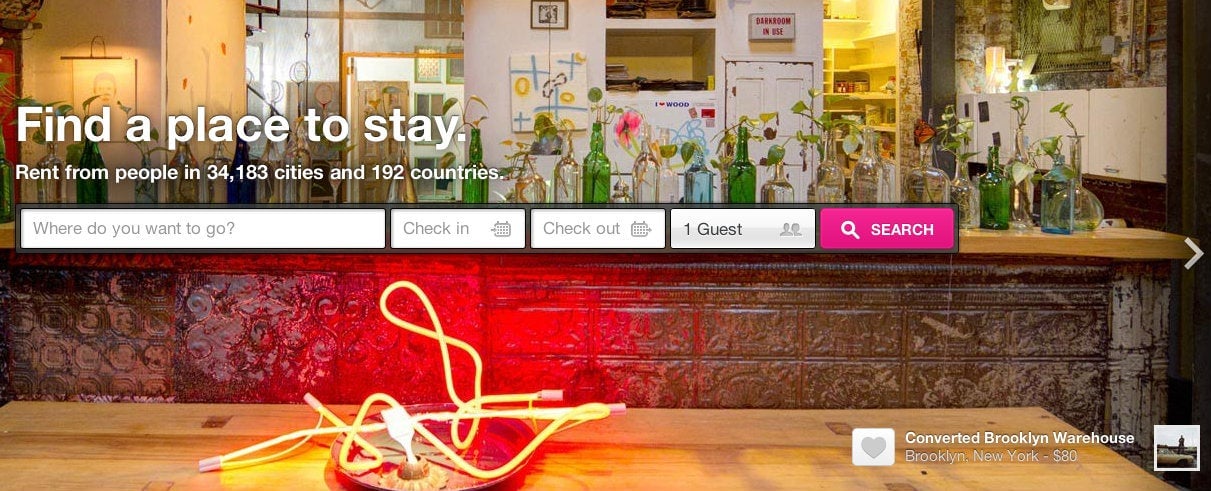Airbnb could squander billions fighting every landlord in the world
So is it legal or not to use Airbnb in New York City?

So is it legal or not to use Airbnb in New York City?
Earlier this week, a New York City judge likened an apartment rented out through the online service to an “illegal hotel” and fined the offender, Nigel Warren, $2,400. But what about everyone else? Do New Yorkers who planned to make a few bucks this coming holiday weekend risk getting into trouble also?
A New York state law does indeed forbid rentals for less than 29 days unless the tenant is living there at the same time. But rather than acknowledging this very real challenge to its business model, Airbnb continues to operate in denial. Even more dangerously, it’s asking that of customers. Consider this email the company sent users yesterday:
…this points out with absolute clarity that the laws in New York need to be changed so this can never happen again. While there is universal acknowledgement that hosts like Nigel were not the intended target of the law, that provides little comfort to the few who find themselves subject to these fines.
The bottom line of yesterday’s news is that the judge’s decision simply creates even more confusion around an already confusing New York law. As always, we urge our hosts to learn about and obey all of the local laws in their cities. But it is often hard to predict how individual city administrators will interpret laws like this, and that needs to change.
Translation: Figure out the local law in your city. If that city is New York, the law is unclear. Well, it’s kind of clear but we don’t like it.
Airbnb has no shortage of supporters who say regulators will have to come around and embrace the so-called sharing economy. Wired wrote yesterday: “…even the most stubborn pencil pushers won’t be able to resist change for long. After all, even bureaucrats have extra bedrooms.”
But Airbnb has bigger problems than a chilly reception from city governments around the world. Instead of targeting the arcane short-term hotel law, it might want to look at the more widespread rule being flouted around the world. Check out this standard lease agreement from Michigan:
Subleasing, Sharing, Assignment and Guest at Premises: No subleasing, sharing of Premises, or assignment of agreement is permitted…
Here’s another from Ontario:
The Tenant shall not assign or sublet the premises without the prior written consent of the Landlord.
Here’s New Zealand:
If not expressly prohibited by the landlord, the tenant may sublet or assign the premises with the landlord’s prior written consent…
A letter from your landlord saying it’s okay to make a few bucks for the weekend off a total stranger? Good luck.
But Airbnb functions under the premise that those inhabiting an apartment have the right to let it out. As the leases above show, the reality is that most people do not. Hosts on Airbnb know this. Airbnb knows this. (That’s why it dodges the frequently asked question on on its website: “Do I need to be there with my guests? It’s up to you! Airbnb does not require you to be present while guests are staying in your space.” Then the perfunctory: “rules and regulations differ from place to place…”)
Ignorance, real or feigned, has been critical to Airbnb’s success.
But the timing couldn’t be worse for Airbnb, whose looming IPO is one of the most anticipated of the year. It’s been an investors’ darling with valuations touching the $2.5 billion range and some fervent believers predicting annual revenues could top $1 billion.
In an interview with Skift earlier this year, Airbnb’s public policy head David Hantman actually said, “We can’t possibly keep up with the law in all the cities. … What we’d like to do is figure out a way to make New York the model city.”
The real estate sector, in which Airbnb operates, is infamously corrupt—everyone looks the other way to get around the rules. I’ve done it, too. Years ago, when I got a new job hundreds of miles away from my apartment, I slipped the superintendent $200 and told him to tell anyone who asked that I lived there on weekends so I’d be in compliance with our building rules.
Airbnb is doing the same—on a massive scale. I asked the company to comment and it referred me to this blog post by Hantman, referring to the New York ruling and Nigel Warren’s case:
We believed, and still believe, that as long as a host is present during a stay, the stay is legal. That is why we intervened in this case.
As expected, the company is being called on its duplicity. A commenter named Alex wrote:
Also… if you seriously believe “so long as the host is present during the stay, the stay is legal”… Then why is there an option to select “Entire home/apartment” when searching for a place to stay in NY? … I don’t think you’re going to be able to BS your way out of this.
No time like pre-IPO to keep up with the law—and cut the BS.